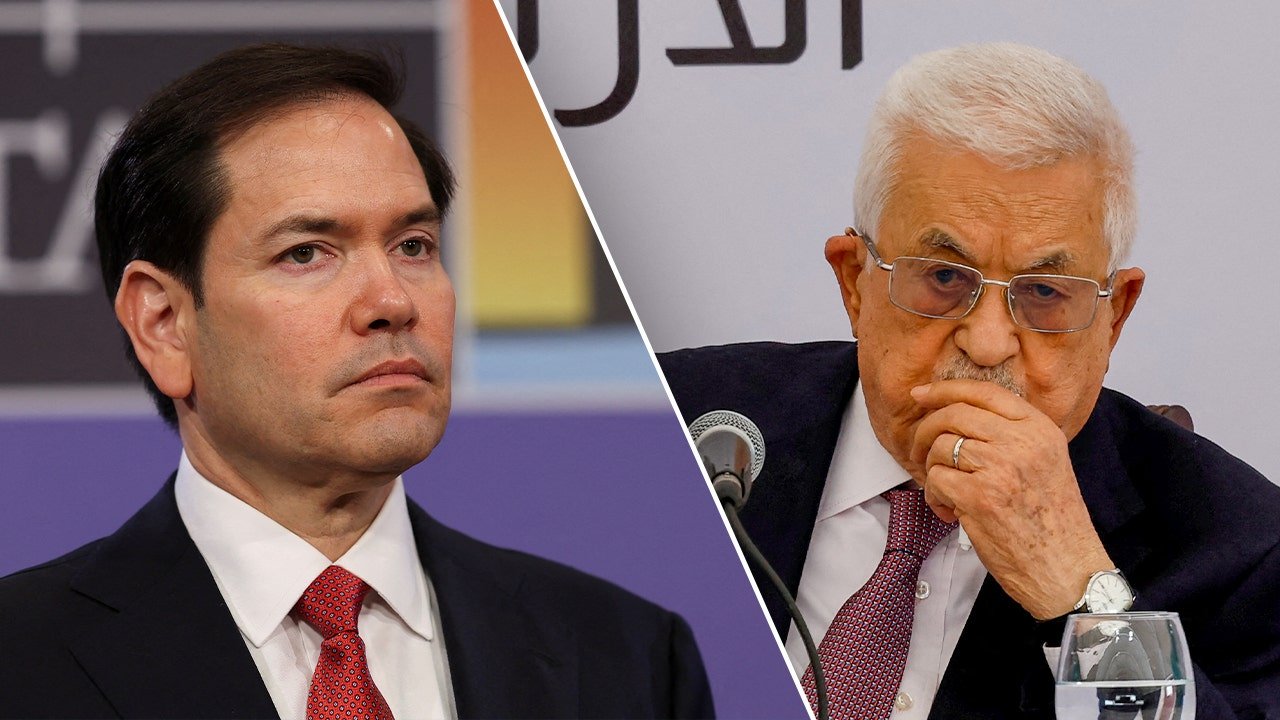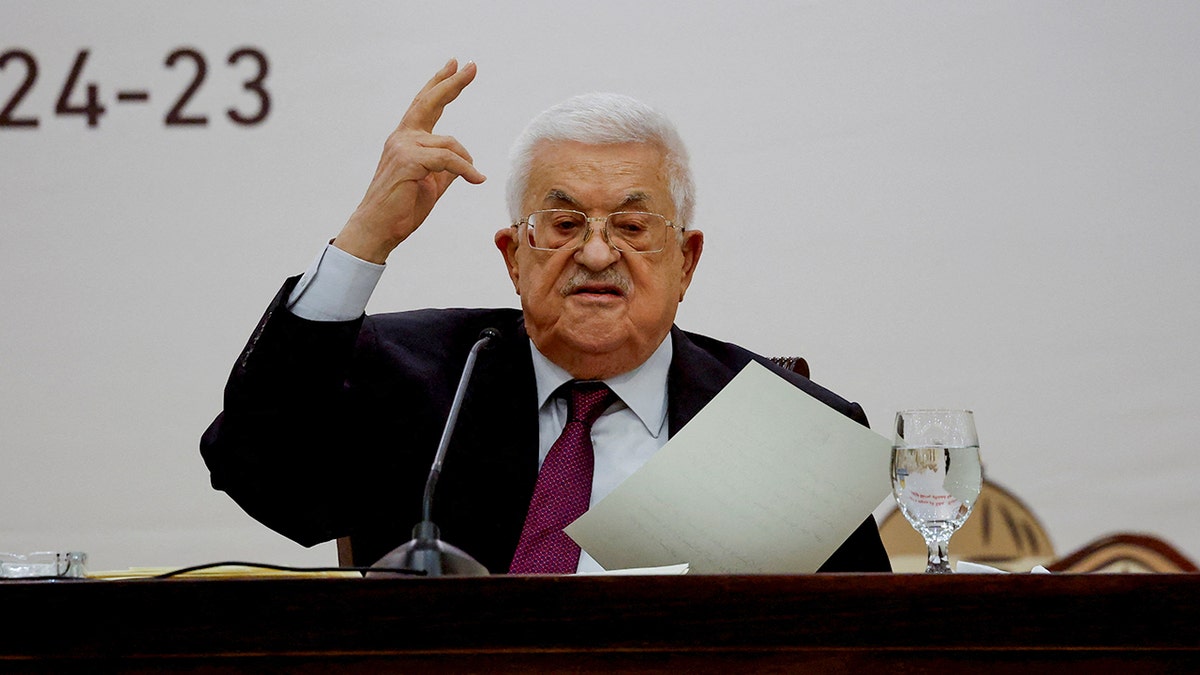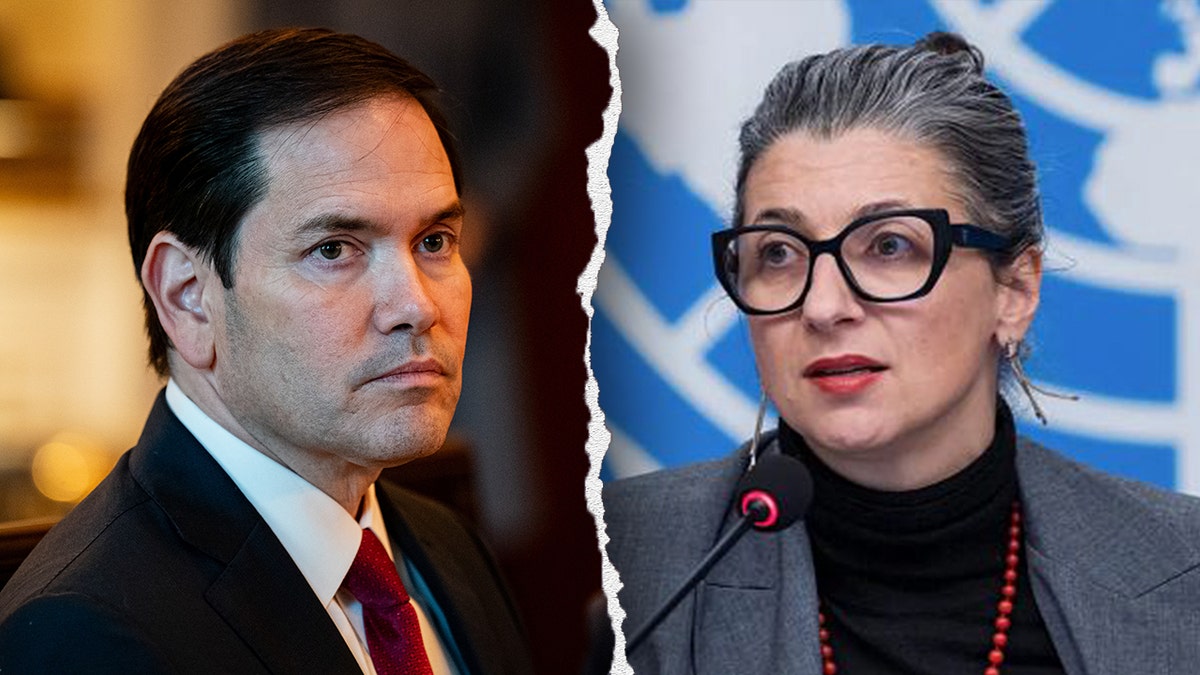INTERNACIONAL
US sanctions Palestinian Authority officials after rejecting global push to give it control of Gaza

NEWYou can now listen to Fox News articles!
The U.S. announced it would impose sanctions on Palestinian Authority (PA) officials just days after it disavowed a United Nations conference in which multiple countries agreed the PA should take over Gaza. Additionally, the U.S. sanctioned members of the Palestine Liberation Organization (PLO).
The State Department told Congress that neither the PA nor the PLO are acting in compliance with the PLO Commitments Compliance Act of 1989 (PLOCCA) and the Middle East Peace Commitments Act of 2002 (MEPCA). As a result of the sanctions, PLO members and PA officials will be denied U.S. visas.
«It is in our national security interests to impose consequences and hold the PLO and PA accountable for not complying with their commitments and undermining the prospects for peace,» a State Department statement read.
The PLOCCA states any dialogue between the U.S. and the PLO is «contingent upon the PLO’s recognition of Israel’s right to exist, its acceptance of United Nations Security Council Resolutions 242 and 338, and its abstention from and renunciation of all acts of terrorism.»
TRUMP: HAMAS SURRENDER, HOSTAGE RELEASE IS ‘FASTEST WAY’ TO END GAZA WAR
The State Department announced sanctions against Palestinian Authority officials and Palestine Liberation Organization members. (Mohammed Torokman)
The MEPCA builds on the PLOCCA by requiring the imposition of sanctions if the president «determines that these entities have not complied with certain commitments made by the entities, and for other purposes.»
The State Department said that both the PA and the PLO violated the PLOCCA and MEPCA by «initiating and supporting actions at international organizations that undermine and contradict prior commitments» and «taking actions to internationalize its conflict with Israel.»

Palestinian Authority President Mahmoud Abbas holds leadership meeting in Ramallah, in the West Bank, April 23, 2025. (REUTERS/Mohammed Torokman)
WATCHDOG BACKS RUBIO’S SANCTIONS ON UN OFFICIAL OVER ‘SHAMEFUL EFFORTS’ TARGETING US, ISRAEL
It also condemned the PA and PLO for supporting terrorism, inciting and glorifying violence, and providing payments and benefits to families of Palestinian terrorists. Israel often refers to the policy of paying terrorists’ families as «pay-for-slay.»
Israeli Foreign Minister Gideon Sa’ar praised the U.S. for issuing the sanctions and thanked Secretary of State Marco Rubio and the State Department for their «moral clarity.»
«The PA must be held accountable for its ongoing policy of ‘Pay-for-Slay’ for terrorists and their families and incitement against Israel in its schools, textbooks, mosques and media,» Sa’ar wrote on X. «This important action by [President Donald Trump] and his administration also exposes the moral distortion of certain countries that ran to recognize a virtual Palestinian state while turning a blind eye to its support for terror and incitement.»

In this composite image, Secretary of State Marco Rubio looks on in the left panel and UN Special Rapporteur for the territory of Palestine Francesca Albanese speaks at the UN in the right panel. (Getty Images)
The announcement of sanctions comes just days after several countries signed onto an agreement at a conference co-chaired by France and Saudi Arabia. The «New York Declaration» calls on Hamas to disarm and surrender control of the Gaza Strip to the PA, something both Israel and the U.S. rejected.
Additionally, earlier this month, the U.S. announced sanctions against U.N. Special Rapporteur Francesca Albanese over her «biased and malicious activities.»
«Albanese has spewed unabashed antisemitism, expressed support for terrorism, and open contempt for the United States, Israel, and the West. That bias has been apparent across the span of her career, including recommending that the ICC, without a legitimate basis, issue arrest warrants targeting Israeli Prime Minister Benjamin Netanyahu and former Defense Minister Yoav Gallant,» Rubio said in a statement.
terrorism,israel,sanctions,middle east,secretary of state
INTERNACIONAL
Nobel Peace Prize recipient Machado pledges to return to Venezuela, sees ‘alarming’ internal crackdown

NEWYou can now listen to Fox News articles!
Venezuelan opposition leader Maria Corina Machado has vowed to return to Venezuela «as soon as possible» following America’s capture of dictator Nicolás Maduro, warning that the current regime is escalating an internal crackdown on dissent and journalists.
Speaking to «Hannity» on Monday, Machado said the moment is now right for her return after spending more than a year in hiding. She secretly escaped Venezuela last month and traveled to Norway to receive the Nobel Peace Prize, which she dedicated to President Donald Trump.
«Well, first of all, I’m planning to go back to Venezuela as soon as possible,» Machado said.
TRUMP ISSUES DIRECT WARNING TO VENEZUELA’S NEW LEADER DELCY RODRÍGUEZ FOLLOWING MADURO CAPTURE
Opposition leader Maria Corina Machado gestures during an anti-government protest on Jan. 9, 2025, in Caracas, Venezuela (Jesus Vargas/Getty Images)
«As I’ve always said, Sean, every day I make a decision where I am more useful for our cause. That’s why I stayed in hiding for over 16 months, and that’s why I decided to go out, because I believed that at this moment I’m more useful to our cause, being able to speak out from where I’m at right now. But I’m going to go as soon possible back home.»
Machado said developments in the past 24 hours have been deeply concerning, pointing to what she described as a sweeping executive order signed by Maduro on the same day he was captured and flown out of the country by U.S. forces.
«What we’re seeing right now in the last 24 hours is really alarming,» she said.
Machado said the order mandates the persecution of Venezuelans who support Trump’s actions and claimed at least 14 journalists have been detained. A state of emergency decree issued Saturday, but published Monday, orders police to «immediately begin the national search and capture of everyone involved in the promotion or support for the armed attack by the United States,» the text of the decree reads, according to Reuters.
She said the situation must be closely monitored by the United States and the Venezuelan people, arguing that the transition away from Maduro must continue.
BONDI SAYS TRUMP ‘SAVED COUNTLESS LIVES’ IN VENEZUELAN DICTATOR MADURO CAPTURE OPERATION

Nicolás Maduro is seen in handcuffs after landing at a Manhattan helipad, escorted by heavily armed federal agents as they make their way into an armored car en route to a federal courthouse on Jan. 5, 2026, in New York City (XNY/Star Max/GC Images via Getty Images)
«So this is very alarming. This is something that has to be followed carefully, I’m sure, by the United States government and by the Venezuelan people,» she said. «And certainly we believe that this transition should move forward.»
Machado also sharply criticized Venezuelan Vice President Delcy Rodríguez, calling her unfit to lead any transitional authority. Rodríguez, who has been vice president under Maduro since 2018, was sworn in as interim president on Monday.
«Delcy Rodriguez, as you know, is one of the main architects of torture, persecution, corruption, narco trafficking,» Machado said. «She’s the main ally and liaison with Russia, China, Iran, certainly not an individual that could be trusted by international investors. And she’s really rejected, repudiated by the Venezuelan people.»
CLICK HERE TO DOWNLOAD THE FOX NEWS APP

Venezuelan opposition leader Maria Corina Machado addresses supporters at a protest against President Nicolás Maduro in Caracas, Venezuela, Thursday, Jan. 9, 2025, the day before his inauguration for a third term. (AP Photo/Ariana Cubillos)
Machado’s comments came just two days after the Trump administration announced that U.S. forces had captured the dictator and his wife, Cilia Flores, after successful «large-scale» military strikes targeting the Venezuelan government. The dictator and his wife are now being held in New York while they await trial on narco-terrorism charges.
Fox News’ Maria Lencki and Louis Casiano contributed to this report.
world,politics,geopolitics,south america,crime world,donald trump
INTERNACIONAL
Delcy Rodríguez juró como presidenta de Venezuela: «Vengo con dolor por el secuestro de dos héroes que tenemos de rehenes en Estados Unidos»

Delcy Rodríguez juró este lunes como nueva presidenta de Venezuela tras el arresto de Nicolás Maduro por parte de la administración de Donald Trump. «Vengo con dolor (a jurar) por el secuestro de dos héroes que tenemos de rehenes en Estados Unidos», dijo.
Con su mano derecha en alto, Rodríguez sostuvo que afrontaba el juramento «con dolor por el sufrimiento que se le ha causado al pueblo venezolano luego de una agresión militar ilegítima«.
Rodríguez prestó juramente ante Jorge Rodríguez, su hermano, quien fue fue reelecto como presidente del Parlamento.
Tras la referencia al operativo de los Delta Force de Estados Unidos para capturar a Nicolás Maduro y a su esposa Cilia Flores, la ahora a cargo del Ejecutivo venezolano añadió que ese dolor es también por «el secuestro de los héroes«, ahora en manos de la Justicia norteamericana con cargos vinculados al narcotráfico y terrorismo.
Sin embargo, en el final llegó el mensaje político de su juramento, ya que convocó a todos los sectores políticos, sociales y económicos del país «para sacar adelante a Venezuela en estas horas terribles».
«Juro por Bolívar, juro por nuestros libertadores, juro por nuestra libertadora y juro por nuestros hermanos y hermanas que nos acompañan y deben sumarse como un solo pueblo desde todos los sectores políticos de Venezuela, desde todos los sectores sociales, económicos, que juremos como un solo país para sacar adelante a Venezuela en estas horas terribles de amenaza contra la estabilidad y la paz de la nación. Juro».
«Vengo con dolor pero debo decir que vengo también con honor», dijo hacia el inicio de su juramento. Explicó que lo hizo por sus compatriotas y los próceres del país, entre los cuales destacó a Simón Bolivar, máximo referente histórico del chavismo.
También juró por Hugo Chávez sobre el cual afirmó que «dio vida a millones de venezolanos y de venezolanas». «Les devolvió la dignidad como ciudadanos y como ciudadanas», añadió.
Con la mirada fija a quien le tomó juramento, su hermano, y sin bajar su mano, habló de los niños venezolanos y de la juventud, a quienes les prometió «porvenir y futuro».
Enumeró a familiares por los que también juró y, agregó, lo hizo «con honor». Prometió no darle descanso a su brazo «ni reposo» a su alma «para ver a Venezuela en el destino que le corresponde, en el pedestal de honor histórico que le corresponde como una nación libre, soberana e independiente».
«Juro por el pueblo de Venezuela, a no descansar ni un minuto para garantizar la paz de la república, la tranquilidad espiritual de nuestro pueblo, la tranquilidad económica y social de nuestro pueblo y juro entonces sobre las bases de nuestro padre libertador en su discurso en Angostura», continuó su juramento que duró casi cinco minutos.
Ya sobre el final, habló de «garantizar un gobierno que de felicidad social, estabilidad política y seguridad política».
El Parlamento de Venezuela inauguró este lunes un nuevo periodo legislativo (2026-2031) dominado nuevamente por el chavismo, en medio de la incertidumbre sobre qué rumbo tomará el régimen después de que Delcy Rodríguez tendió la mano a Estados Unidos el domingo para cooperar.
De los 285 diputados de la Asamblea Nacional 256 son afectos a Maduro, quien enfrenta cargos de narcotráfico y terrorismo en un tribunal federal en Nueva York.
Maduro y su mujer Cilia Flores fueron extraídos de su casa en una base militar en Caracas y llevados a la fuerza a Estados Unidos, en un operativo sorpresa que se cobró la vida de varios venezolanos, al menos 20 o cerca de 40, según las fuentes.
Durante la sesión inaugural, Nicolás Maduro Guerra, hijo del depuesto líder, dijo el lunes que su padre y la primera dama Cilia Flores «volverán» a Venezuela «más temprano que tarde» de Estados Unidos.
«Ellos volverán. Nuestros ojos lo verán. Seremos testigos de ese momento histórico. No tengan dudas que eso va a pasar en el nombre de Dios todopoderoso», dijo el diputado Maduro Guerra en la instalación del Parlamento.
En tanto, el hijo de Maduro luego brindó su «apoyo incondicional» a la presidenta interina de Venezuela, Delcy Rodríguez.
INTERNACIONAL
Over 1,000 arrested in ‘massive’ Minnesota operation, including murderers, rapists, pedophiles

NEWYou can now listen to Fox News articles!
Federal authorities have arrested more than 1,000 in Minnesota, including alleged murderers, rapists, pedophiles and gang members, after sending a surge of agents to the state in its «massive» response to the rampant fraud still being uncovered.
Assistant Homeland Security Secretary Tricia McLaughlin told Fox News Digital that since the agency «surged law enforcement» to Minnesota last week, it «has already made more than 1,000 arrests of murderers, rapists, pedophiles, and gang members.»
DHS said that among those arrested was a Somali criminal illegal alien named Liban Ali Osman, 43, who the agency said was convicted of robbery in Columbus, Ohio. Osman was sentenced to three years in prison and has had a final order of removal since May 17, 2011.
Another, Vannaleut Keomany, a 59-year-old criminal illegal alien from Laos, arrested in the crackdown, was convicted of two counts of rape, also in Columbus. DHS said Keomany was sentenced to seven years in prison and has had a final order of removal since Dec. 17, 2009.
FRAUD FALLOUT FORCES DEMOCRATIC GOV. TIM WALZ TO ABANDON MINNESOTA RE-ELECTION BID
Homeland Security investigators were part of a large fraud investigation on Monday in Minneapolis following the release of a video on alleged day care fraud. (Department of Homeland Security)
Federal agents also arrested another Laotian, Por Moua, 50, during the operation. Moua has convictions for first-degree great bodily harm, sexual intercourse with a child in California, and false imprisonment.
A third Laotian, Sing Radsmikham, 52, was arrested in the operation and has been convicted of fourth-degree criminal sexual conduct using force or coercion in Roseau County, Minnesota. He has had a final order of removal since 2004.
Tou Vang, a 42-year-old from Laos, was arrested and has been convicted of first-degree criminal sexual conduct with a child under 13. Vang has had a final order of removal since 2006.
Somvang Phrachansiry, a 63-year-old from Laos, was arrested. He has been convicted of third-degree criminal sexual conduct and second-degree assault with a dangerous weapon and has had a final order of removal since 2001.
Javier Bulmaro Turrubiartes, a 49-year-old criminal alien from Mexico, was arrested in Minnesota. Turrubiartes has previously been arrested for soliciting children through electronic communication to engage in sexual conduct and convicted of hiring or agreeing to hire a child under 16 for prostitution.
ICE BLASTS HILTON AFTER EMAILS ALLEGEDLY SHOW HOTEL REFUSING ROOMS TO IMMIGRATION AGENTS

Left to right from top: Ban Du La Sein, Vannaleut Keomany, Sing Radsmikham, Liban Ali Osman, Tou Vang, Por Moua, Javier Bulmaro Turrubiartes, Somvang Phrachansiry, Angel Edwin Quiquintuna Capuz and Joel Cuautle-Ocelotl. (Stephen Maturen/Getty Images; DHS)
Another illegal from Mexico, Joel Cuautle-Ocelotl, 51, was nabbed in the roundup. He has been convicted of third-degree assault with intent to cause physical injury in New York and driving while impaired in Minnesota.
Ban Du La Sein, a 47-year-old from Burma who has been convicted of third-degree criminal sexual conduct using force or coercion in Nobles County, Minnesota, was also arrested.
Angel Edwin Quiquintuna Capuz, a 26-year-old from Ecuador, was arrested by federal agents. Capuz has previously been convicted of robbery in Columbus and been arrested for driving while intoxicated, assaulting a police officer, obstructing the legal process and disarming a peace officer.
DHS surged roughly 2,000 federal agents and officers from U.S. Immigration and Customs Enforcement’s deportation branch and Homeland Security Investigations, according to CBS News. The outlet reported the operation will be a 30-day surge in the Twin Cities area. It also said that U.S. Customs and Border Protection Commander Gregory Bovino will help oversee the operation.
McLaughlin said that «while for the safety of our officers we do not get into law enforcement footprint,» she confirmed that «DHS has surged law enforcement» to the Twin Cities area.
KLOBUCHAR WEIGHING RUN FOR MINNESOTA GOVERNOR AS WALZ ENDS RE-ELECTION BID AMID FRAUD SCANDAL

Agents with the Department of Homeland Security in a Minneapolis store. The agency said it had launched an operation to identify, arrest and remove criminals who are suspected of fraud. (Department of Homeland Security)
Minnesota has come under intense scrutiny in recent weeks after authorities revealed multimillion-dollar fraud operations in the state, resulting in dozens of arrests and indictments.
Last week, Homeland Security announced it was launching a «massive operation» in Minnesota to «identify, arrest, and remove criminals who are defrauding the American people.»
CLICK HERE TO DOWNLOAD THE FOX NEWS APP
The announcement came after the release of a video by an independent journalist who questioned daycare center operators in the area.
In an X post, the agency vowed to «root out this rampant fraud plaguing Minnesota.»
Fox News Digital’s Luis Casiano contributed to this report.
minnesota fraud exposed,somali immigrant community,illegal immigrants,immigration,migrant crime,homeland security,minnesota

 CHIMENTOS3 días ago
CHIMENTOS3 días agoEl inesperado acercamiento de Wanda Nara a un ex de la China Suárez que desató un escándalo: “El like a Rusherking que nadie esperaba”

 CHIMENTOS2 días ago
CHIMENTOS2 días agoLuis Ventura reveló los motivos detrás de la pelea de Juana Repetto y su hermano Bautista Lena: “Esto viene de crianzas y culturas diferentes”, analizó

 INTERNACIONAL20 horas ago
INTERNACIONAL20 horas ago‘Nos están invadiendo’: El ataque de EE.UU. visto desde los celulares de venezolanos



























